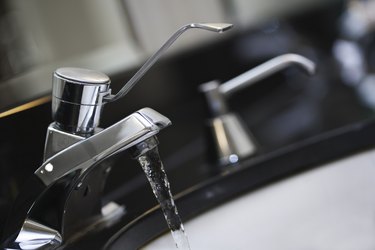
Sodium carbonate is more commonly known as washing soda. Like the similar-sounding compound sodium bicarbonate—baking soda—it's basic, and can react with acids. HCl, or hydrochloric acid, is a strong acid that reacts with sodium carbonate. The reaction produces large quantities of carbon dioxide gas, water and table salt.
Sodium Carbonate
Video of the Day
Sodium carbonate has the chemical formula Na2CO3. It has several different applications, one of which is producing certain kinds of glass. On a household level, however, sodium carbonate has everyday utility as a water softener. Many communities have large quantities of calcium and magnesium ions—positively charged particles—in the water, which prevent detergent from working as efficiently. Sodium carbonate added to water helps to remove magnesium and calcium ions, and increases detergent efficiency.
Video of the Day
HCl
HCl is the chemical formula for hydrochloric acid, which is a strong inorganic—meaning not carbon-based—acid, explains Dr. Martin Silberberg in his book "Chemistry: The Molecular Nature of Matter and Change." Like all acids, HCl has the ability to lose its hydrogen atom in water-based solution. If there's a base present, HCl gives its hydrogen to the base. This produces two new compounds, neither one of which is a strong acid or a strong base, and is called a neutralization reaction.
Sodium Carbonate and HCl
When you mix sodium carbonate and HCl, two molecules of HCl give their hydrogen atoms to the sodium carbonate. This produces carbonic acid, with the formula H2CO3. The sodium from sodium carbonate forms a salt with the chloride particles from the HCl, producing sodium chloride, or table salt. Carbonic acid is quite unstable, explain Drs. Reginald Garrett and Charles Grisham in their book "Biochemistry," and falls apart into carbon dioxide—CO2—and water.
Utility of Reaction
Because hydrochloric acid isn't something you're likely to have around the house, it's rare that you would actually mix sodium carbonate and HCl yourself. However, the reaction does have some utility on an industrial scale, as sodium carbonate can be used to help remove excess HCl from a solution. Selectively removing a certain amount of acid from a solution to control the pH—the acidity level—of the final solution is commonplace in industry.